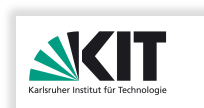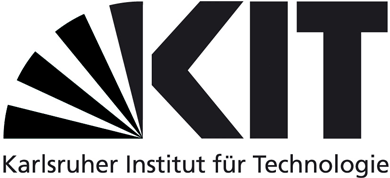Current announcements
- A corrected version of the lecture notes is now available.
- The full list of questions for the oral exam is available for download.
- The complete lecture notes are now available.
- The results of your evaluation of the tutorials are available here.
- The lecture notes including Section 4.1 are now available for download.
- A draft version of the questions for the exams is available here.
- The lecture notes were updated and now contain a completely revisited convergence analysis of Lawson methods.
- Announcement of the study dean concerning the Fakultätslehrpreis 2018, deadline January 19
- Show old announcements
People
- Prof. Dr. Marlis Hochbruck (lectures)
- Dr. David Hipp (problem classes)
- Dr. Andreas Sturm (problem classes)
Weekly hours
2h lecture + 2h problem class (6 credit points)
Contents and Prerequisites
In this class we consider the construction, analysis, implementation and application of exponential integrators. The focus will be on two types of stiff problems.
The first one is characterized by a Jacobian that possesses eigenvalues with large negative real parts. Parabolic partial differential equations and their spatial discretization are typical examples. The second class consists of highly oscillatory problems with purely imaginary eigenvalues of large modulus.
Apart from motivating the construction of exponential integrators for various classes of problems, our main intention in this class is to present the mathematics behind these methods. We will derive error bounds that are independent of stiffness or highest frequencies in the system.
Since the implementation of exponential integrators requires the evaluation of the product of a matrix function with a vector, we will briefly discuss some possible approaches as well.
The course is meant for advanced Master students who are familiar with the basics of finite element methods and numerical methods for differential equations. Some knowledge on functional analysis is also helpful.
Schedule
Lectures and tutorials
| Tuesday, | 15:45-17:15 in SR 3.061, building 20.30 |
| Friday, | 9:45-11:15 in SR 3.061, building 20.30 |
| Monday, | 15:45-17:15 in SR 3.061, building 20.30 (alternative date) |
Concrete dates
Please note that the dates for the lectures and problem classes may vary from week to week. The dates for the next weeks are listed below. If changes to already announced dates are required they will be highlighted by color.
| cw 42: | Monday | 16.10. | (lecture) | and | Friday | 20.10. | (lecture) |
| cw 43: | Monday | 23.10. | (lecture) | and | Tuesday | 24.10. | (tutorial) |
| cw 44: | Friday | 03.11. | (lecture) | ||||
| cw 45: | Monday | 06.11. | (lecture) | and | Tuesday | 07.11. | (tutorial) |
| cw 46: | Monday | 13.11. | (lecture) | and | Tuesday | 14.11. | (lecture) |
| cw 47: | Monday | 20.11. | (lecture) | and | Tuesday | 21.11. | (tutorial) |
| cw 48: | Monday | 27.11. | (lecture) | and | Tuesday | 28.11. | (lecture) |
| cw 49: | Monday | 04.12. | (tutorial) | and | Tuesday | 05.12. | (lecture) |
| cw 50: | Monday | 11.12. | (lecture) | and | postponed | (lecture) | |
| cw 51: | Monday | 18.12. | (tutorial) | and | Friday | 22.12. | (lecture) |
| cw 02: | Tuesday | 09.01. | (lecture) | and | Friday | 12.01. | (lecture) |
| cw 03: | Monday | 15.01. | (lecture) | and | Tuesday | 16.01. | (lecture) |
| cw 04: | Monday | 22.01. | (tutorial) | and | Tuesday | 23.01. | (lecture) | )
| cw 05: | Tuesday | 30.01. | (lecture) | and | postponed | (lecture) | |
| cw 06: | Monday | 05.02. | (lecture) | and | Tuesday | 06.02. | (lecture) |
| Friday | 09.02. | (tutorial) |
Exams
The format of the exams will be the following:
- Until the end of the semester, we will provide you with a list of possible questions which are classified in three categories.
- You randomly draw three questions from this list, each from another category. One question can be redrawn from the same category with the possibility to answer the original question.
- Then you are given 20 minutes for preparation (without any aid). Any notes that you prepare during this time can be used in the oral exam.
- The actual oral exam will last additional 20 minutes during which you have to answer the questions. This leaves approximatly 7 minutes for each question. If the answer is too short we expect you to present further details of the topic. In order to assure that you understand all aspects of the topic in question, you can always be asked further questions.
- The final grade will be the mean of the grades (1-6) from the three answered questions.
The list of questions can be found here: Questions
Lecture notes
The lecture notes provided here are a draft version, since they are written when the lecture progresses. This includes corrections shortly after the corresponding topic was discussed.
We are grateful for any suggested corrections and improvements.
Problem sheets
sheet 1, sheet 2, sheet 3, sheet 4, sheet 5, sheet 6, sheet 7
Sketch of solutions
solution 1, solution 2, solution 3, solution 4, solution 5, solution 6, solution 7
Literature
- M. Hochbruck, lecture notes on "Finite Element Methods and Time Integration of PDEs", KIT, 2015–2016
- M. Hochbruck, lecture notes on "Numerik I, Numerik II und Numerische Methoden für Differentialgleichungen", KIT, 2013–2016
- M. Hochbruck and A. Ostermann, Exponential Integrators, Acta Numerica, , vol. 19, pp. 209-286, 2010
- M. Hochbruck, A. Ostermann and J. Schweitzer, Exponential Rosenbrock-type methods, SIAM J. Numer. Anal., vol. 47, no. 1, pp. 786—803, 2009
- M. Hochbruck and A. Ostermann, Exponential multistep methods of Adams type, BIT, vol. 51, pp. 889-908, 2011
- M. Hochbruck, Ch. Lubich, On Magnus integrators for time-dependent Schrödinger equations, SIAM J. Numer. Anal., vol. 41, no. 3, pp. 945—963, 2003

